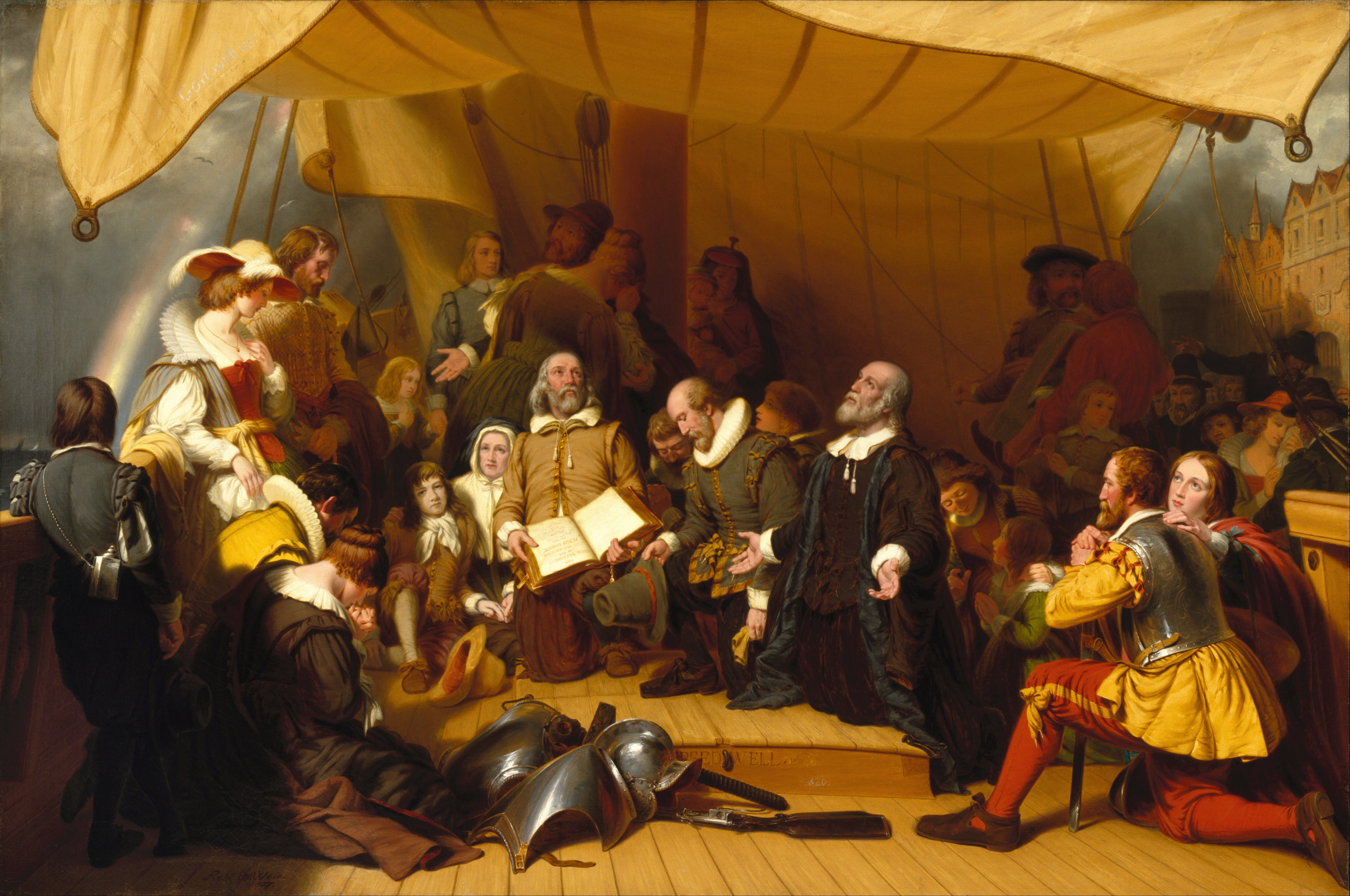|
Forefathers' Day
Forefathers' Day is a holiday celebrated in Plymouth, Massachusetts, on December 22. It is a commemoration of the landing of the Pilgrim Fathers in Plymouth, Massachusetts, on December 21, 1620. It was introduced in Plymouth, Massachusetts, in 1769. Forefathers Day' is celebrated every year by the Old Colony Club, established in 1769 "to honor the forefathers". The celebration begins at 6:00 AM with a march by members to the top of Cole's Hill next to Massasoit's statue, followed by a reading of a proclamation honoring the forefathers and a ritual firing of the club's cannon. The Old Colony Club and the Mayflower Society both include a succotash dinner as part of their celebration. Sauquetash was recorded as a part of the first Thanksgiving. Unlike later versions of succotash, in Plymouth succotash is served as a broth containing large pieces of fowl and meat that are sliced at the table. When the 22nd falls on a Sunday, the Old Colony Club celebrates Forefathers Day' on the ... [...More Info...] [...Related Items...] OR: [Wikipedia] [Google] [Baidu] |
Holiday
A holiday is a day or other period of time set aside for festivals or recreation. ''Public holidays'' are set by public authorities and vary by state or region. Religious holidays are set by religious organisations for their members and are often also observed as public holidays in religious majority countries. Some religious holidays, such as Christmas, have become Secularization, secularised by part or all of those who observe them. In addition to secularisation, many holidays have become commercialised due to the growth of industry. Holidays can be thematic, celebrating or commemorating particular groups, events, or ideas, or non-thematic, days of rest that do not have any particular meaning. In English in the Commonwealth of Nations, Commonwealth English, the term can refer to any period of rest from work, such as vacations or school holidays. In American English, "the holidays" typically refers to the period from Thanksgiving (United States), Thanksgiving to New Year's Eve, N ... [...More Info...] [...Related Items...] OR: [Wikipedia] [Google] [Baidu] |
Plymouth, Massachusetts
Plymouth ( ; historically also spelled as Plimouth and Plimoth) is a town in and the county seat of Plymouth County, Massachusetts, United States. Located in Greater Boston, the town holds a place of great prominence in American history, folklore, and culture, and is known as "America's Hometown". Plymouth was the site of the colony founded in 1620 by the ''Mayflower'' Pilgrims (Plymouth Colony), Pilgrims, where New England was first established. It is the oldest municipality in New England and one of the oldest in the United States. The town has served as the location of several prominent events, one of the more notable being the Thanksgiving (United States)#Harvest festival observed by the Pilgrims at Plymouth, First Thanksgiving feast. Plymouth served as the capital of Plymouth Colony from its founding in 1620 until the colony's merger with the Massachusetts Bay Colony in 1691. The English explorer John Smith (explorer), John Smith named the area Plymouth (after the city in Sou ... [...More Info...] [...Related Items...] OR: [Wikipedia] [Google] [Baidu] |
Pilgrim Fathers
The Pilgrims, also known as the Pilgrim Fathers, were the English settlers who travelled to North America on the ship ''Mayflower'' and established the Plymouth Colony at what now is Plymouth, Massachusetts, United States. John Smith had named this territory New Plymouth in 1620, sharing the name of the Pilgrims' final departure port of Plymouth, Devon, England. The Pilgrims' leadership came from religious congregations of Brownists or Separatists who had fled religious persecution in England for the tolerance of 17th-century Holland in the Netherlands. These Separatists held many of the same Calvinist religious beliefs as Puritans, but unlike Puritans (who wanted a purified established church), Pilgrims believed that their congregations should separate from the Church of England, which led to their being labelled Separatists. After several years of living in exile in Holland, they determined to establish a new settlement in the New World and arranged with investors to fund ... [...More Info...] [...Related Items...] OR: [Wikipedia] [Google] [Baidu] |
Old Colony Club
The Old Colony Club is one of the oldest gentlemen's clubs in the United States, founded in 1769 in Plymouth, Massachusetts. History The club was founded in January 1769, by Isaac Lothrop, Pelham Winslow, Thomas Lothrop, Thomas Mayhew, Elkanah Cushman, John Thomas, Edward Winslow (loyalist), Edward Winslow, Jr. and John Watson. Their intent in creating a private club was to avoid "the many disadvantages and inconveniences that arise from intermixing with the company at the taverns in ... Plymouth." It went moribund during the American Revolution due to a split between Loyalist, Tory and Patriot (American Revolution), Patriot members, but was revived in 1875. Its clubhouse on Court Street was purchased in 1893. Traditions The club meets on Fridays at a much-renovated old American colonial architecture, colonial house on Court Street in downtown Plymouth. The club is best known for its annual celebration of Forefathers' Day, one of the oldest holidays in America, dating fro ... [...More Info...] [...Related Items...] OR: [Wikipedia] [Google] [Baidu] |
Mayflower Society
The General Society of ''Mayflower'' Descendants—commonly called the Mayflower Society—is a hereditary organization of individuals who have documented their descent from at least one of the 102 passengers who arrived on the ''Mayflower'' in 1620 at what is now Plymouth, Massachusetts. The Society was founded at Plymouth in 1897. Organization A primary goal of the Society is to educate the public about the role of the Pilgrims in the early history of what would later become the United States of America. There are Mayflower societies in all 50 United States, the District of Columbia, and Canada. Today, it is estimated that up to tens of millions of Americans have at least one ancestor who was among this group of early settlers. Any person able to document their descent from one or more of the ''Mayflower'' Pilgrims is eligible to apply for membership in the Mayflower Society. The General Society of ''Mayflower'' Descendants is listed as an approved lineage society with th ... [...More Info...] [...Related Items...] OR: [Wikipedia] [Google] [Baidu] |
Succotash
Succotash is a North American vegetable dish consisting primarily of sweet corn with lima beans or other shell beans. The name ''succotash'' is derived from the Narragansett word , which means "broken corn kernels". Other ingredients may be added, such as onions, potatoes, turnips, tomatoes, bell peppers, corned beef, salt pork, or okra. Combining a grain with a legume provides a dish that is high in all essential amino acids. History Succotash has a long history. It is believed to have been an invention of indigenous peoples in what is now known as New England, though English soldier and explorer Jonathan Carver attributed it to numerous tribes of eastern North America:One dish however, which answers nearly the same purpose as bread, is in use among the Ottagaumies, the Saukies, and the more eastern nations, where Indian corn grows, which is not only much esteemed by them, but it is reckoned extremely palatable by all the Europeans who enter their dominions. This is comp ... [...More Info...] [...Related Items...] OR: [Wikipedia] [Google] [Baidu] |
Gregorian Calendar
The Gregorian calendar is the calendar used in most parts of the world. It went into effect in October 1582 following the papal bull issued by Pope Gregory XIII, which introduced it as a modification of, and replacement for, the Julian calendar. The principal change was to space leap years slightly differently to make the average calendar year 365.2425 days long rather than the Julian calendar's 365.25 days, thus more closely approximating the 365.2422-day tropical year, "tropical" or "solar" year that is determined by the Earth's revolution around the Sun. The rule for leap years is that every year divisible by four is a leap year, except for years that are divisible by 100, except in turn for years also divisible by 400. For example 1800 and 1900 were not leap years, but 2000 was. There were two reasons to establish the Gregorian calendar. First, the Julian calendar was based on the estimate that the average solar year is exactly 365.25 days long, an overestimate of a li ... [...More Info...] [...Related Items...] OR: [Wikipedia] [Google] [Baidu] |
Public Holidays In The United States
In the United States, public holidays are set by federal, state, and local governments and are often observed by closing government offices or giving government employees paid time off. The federal government does not require private businesses to close or offer paid time off, as is the case for most state and local governments, so employers determine which holidays to observe. Several federal holidays are widely observed by private businesses with paid time off. These include New Year's Day, Memorial Day, Independence Day, Labor Day, Thanksgiving, and Christmas. Businesses often close or grant paid time off for New Year's Eve, Christmas Eve, and the Day after Thanksgiving, but none of these are federal holidays. Other federal holidays are less widely observed by businesses. Most federal holidays are celebrated on a Monday or Friday to create a three-day weekend. Christmas is the only religious holiday that is a federal holiday. Some businesses allow religious employe ... [...More Info...] [...Related Items...] OR: [Wikipedia] [Google] [Baidu] |
December Observances
December is the twelfth and final month of the year in the Julian and Gregorian calendars. Its length is 31 days. December's name derives from the Latin word ''decem'' (meaning ten) because it was originally the tenth month of the year in the calendar of Romulus , which began in March. The winter days following December were not included as part of any month. Later, the months of January and February were created out of the monthless period and added to the beginning of the calendar, but December retained its name. Macrobius, '' Saturnalia'', tr. Percival Vaughan Davies (New York: Columbia University Press, 1969), book I, chapters 12–13, pp. 89–95. In Ancient Rome, as one of the four Agonalia, this day in honour of Sol Indiges was held on December 11, as was Septimontium. Dies natalis (birthday) was held at the temple of Tellus on December 13, Consualia was held on December 15, Saturnalia was held December 17–23, Opiconsivia was held on December 19, Divalia was ... [...More Info...] [...Related Items...] OR: [Wikipedia] [Google] [Baidu] |






